The digital world for B2B SaaS is changing fast, with AI search engines reshaping how brands are discovered and trusted. Old SEO tactics, like overusing keywords or chasing backlinks, don’t work anymore. AI has changed how potential customers search for and evaluate solutions. This guide offers marketing leaders a clear plan to use AI SEO agents and keep their brand visible in the new AI search environment. Companies that adapt will build strong market presence, while those stuck in old ways might fade from view in AI-driven search platforms.
Why AI Search Makes Traditional SEO Outdated for B2B SaaS
Digital marketing foundations have shifted. Strategies that worked just a couple of years ago, like optimizing for Google’s old algorithms or focusing on backlink numbers, no longer ensure visibility. AI now plays a major role in search interactions. Marketing leaders who overlook this change risk losing digital ground, while those adopting AI-focused strategies can capture more attention.
Understanding the Move to AI-Driven Search
Search engine optimization has moved beyond keywords to content that shows real expertise and answers questions fully, fitting platforms like ChatGPT, Gemini, and Perplexity. This approach differs from older methods, prioritizing content that AI systems recognize as reliable and worth citing.
Your content needs to appear in AI-generated answers across these platforms. Unlike traditional SEO, which focused on website clicks, AI search optimization aims for direct mentions in AI responses. To achieve this, your content must stand as a trusted source for AI models addressing user questions related to your field or product.
For B2B SaaS companies, this means creating content that appeals to both human readers and AI algorithms assessing authority, accuracy, and depth. Meeting these dual needs demands a level of content detail and technical setup that older SEO methods can’t provide.
Facing a Smaller Digital Presence
With AI increasing the amount of content published online each day, individual company voices get quieter without active efforts to stand out. This creates a smaller digital presence, not because your content worsens, but because the volume of competing material grows through AI tools.
Think about the numbers. If your company posts two blog articles a month while AI-driven competitors publish daily, the gap in authority and visibility widens quickly. AI systems see frequent publishing and detailed content as signs of expertise. Sticking to slower posting schedules can push your brand lower in AI recommendations.
This reality drives a content race where both volume and quality matter. B2B SaaS companies must balance high output with strong material since AI search engines value both. Want to lead in AI search? Book a consultation to see how automated content platforms can help.
Daily Content as the New Standard
Information moves at a social media pace now, making daily content posting essential to stay relevant in AI search systems. These systems favor recent, in-depth, and regular updates more than traditional search engines did. Posting just once or twice a month, which used to suffice, now suggests to AI that your brand isn’t actively engaged.
Daily posting isn’t just about frequency. Each piece must show expertise, offer fresh insights, and build your overall authority. AI evaluates your entire content collection, favoring brands that consistently answer user questions with detailed responses across various topics.
This pace has overwhelmed traditional content creation. Marketing teams can’t hire enough staff for daily quality output, and agencies struggle to keep up at this scale. The answer lies in technology, specifically AI agents that can create, optimize, and publish strong content on their own.
What Are AI SEO Agents? A Fresh Approach to Content Authority
AI SEO agents mark a significant step beyond typical content tools. They don’t just write text or suggest improvements. Instead, they act like independent marketing team members, handling full content strategies from research to posting. Marketing leaders need to grasp their potential when tackling AI search challenges.
Defining AI SEO Agents
AI SEO agents are self-operating systems built to position companies as leading voices in their fields through well-planned content efforts. Unlike basic AI writing tools needing constant user input, these agents work independently. They choose content topics, optimization methods, and posting schedules based on market trends and data.
They integrate several functions into smooth processes: keyword research to spot content gaps, content creation for detailed articles, technical tweaks for better SEO, and performance tracking across traditional and AI search platforms. This combination allows content production to scale far beyond human limits while keeping quality high.
The term “agent” highlights their ability to adjust strategies using feedback and competitor insights. This flexibility keeps them effective as AI search rules change, offering lasting benefits over short-term gains.
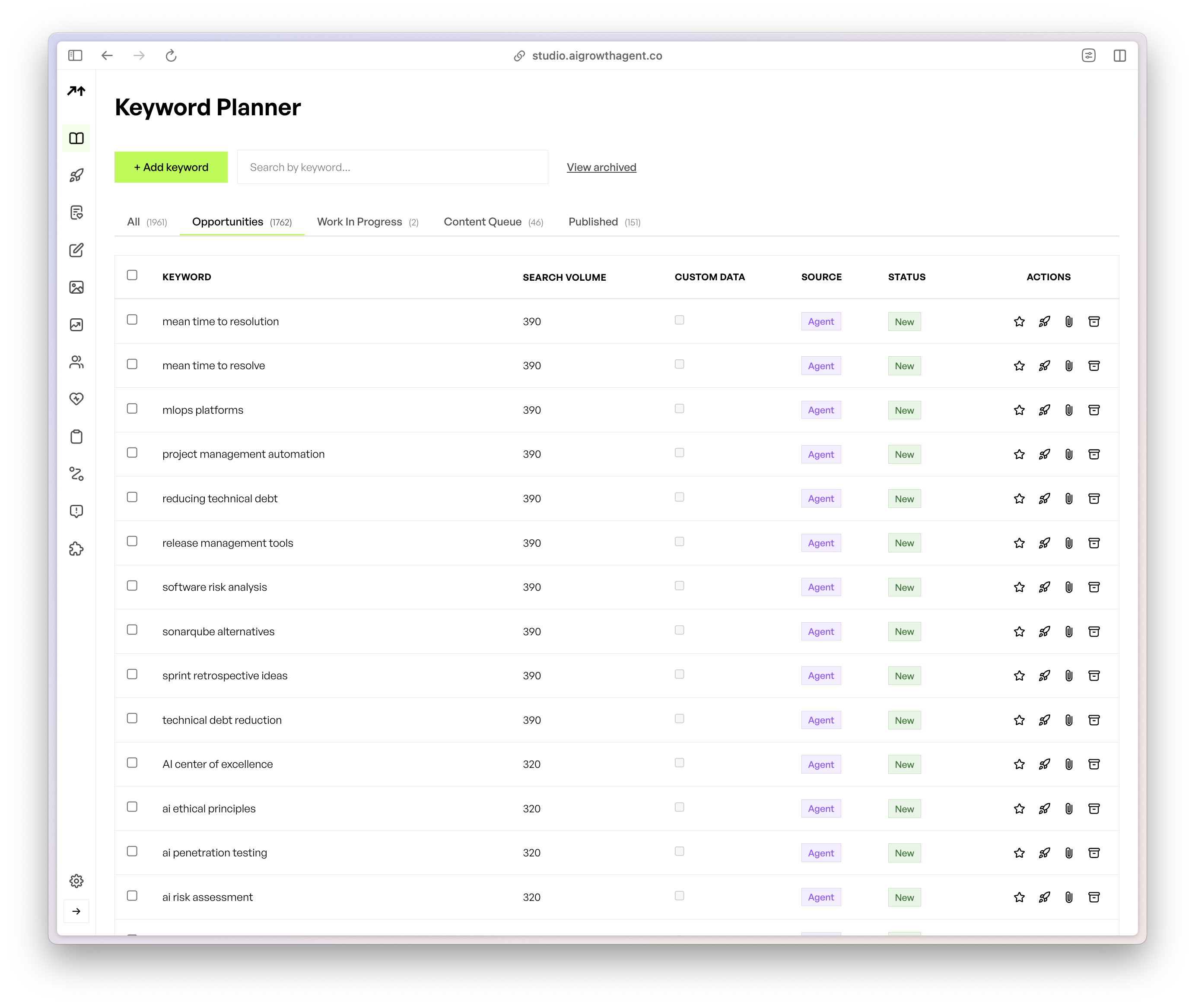
How They Differ from Traditional Options
Traditional SEO agencies rely on human effort and hourly billing, limiting their speed and scale. Researching, writing, editing, and publishing often take weeks, far too slow to build authority in AI systems that value quick, frequent updates.
On the other hand, basic AI content tools like ChatGPT offer speed but lack strategy. They can produce text fast and support some broader tasks with custom features, yet they often need extra user work for full research, optimization, and posting.
AI SEO agents fill this gap, blending strategic planning with AI’s scalability. They learn your company’s unique strengths through detailed setup, keep brand tone steady, and handle full posting workflows without human help. This allows high output without losing quality or focus.
Main Features of AI SEO Agents
AI SEO agents offer abilities that older solutions can’t match. Here are the key features:
- High-volume content creation, producing several quality articles daily while matching your brand tone. This includes research, fact-checking, editing, and planning, all done automatically.
- Technical adjustments for AI search, such as specific data markup, LLM.txt files, and protocols that let AI search engines interact directly with your content. These steps ensure AI can find, interpret, and reference your material correctly.
- Detailed tracking of visibility on both traditional search engines and AI platforms. This covers how often AI mentions your content, competitor performance, and traffic impact, allowing ongoing improvements based on real results.
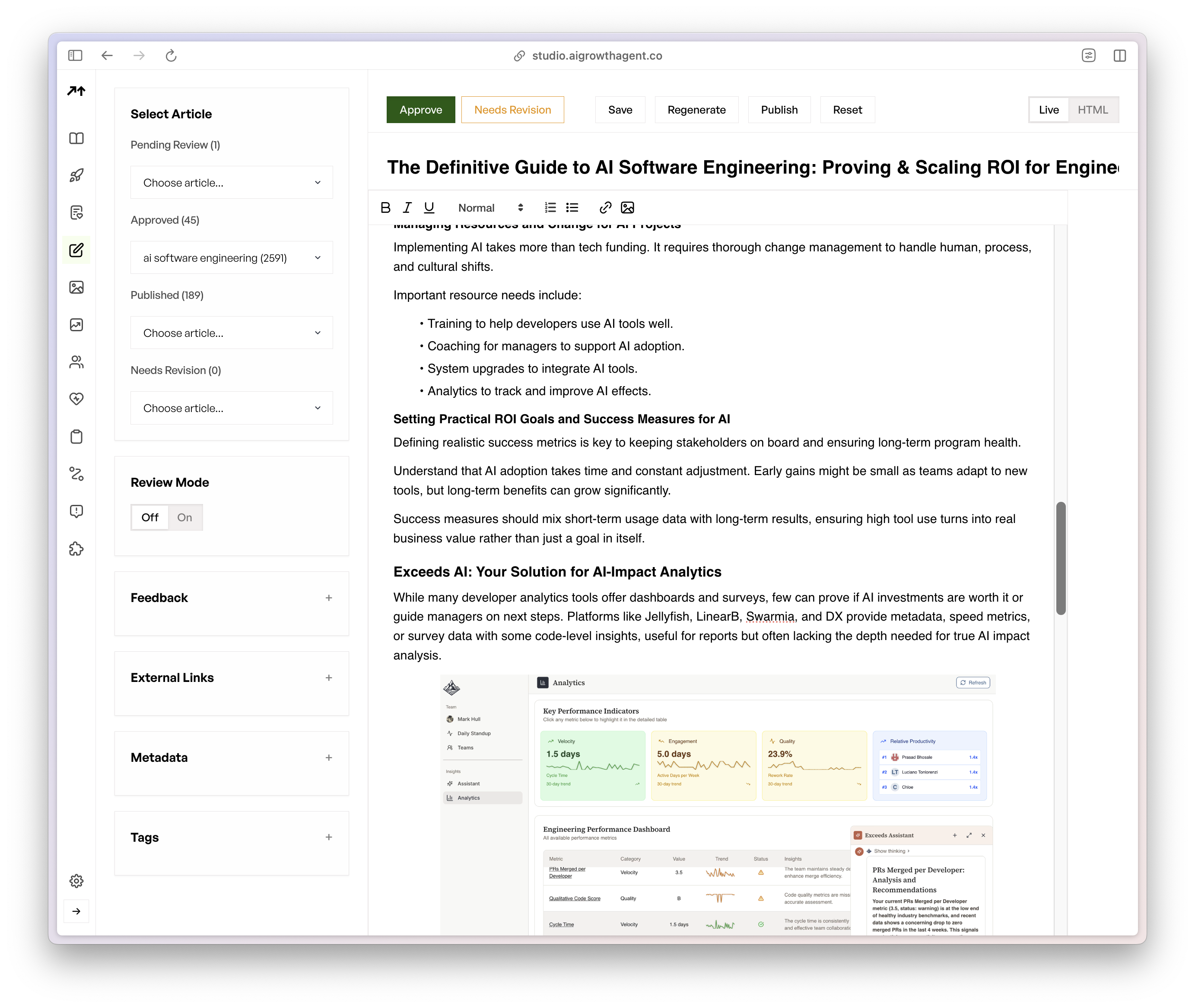
Key Actions to Build Market Authority with AI
Gaining authority in the AI search era calls for a new way of handling content and SEO. AI optimization focuses on signals of trust, posting frequency, user value, and specific technical steps that traditional SEO often misses.
Why Frequent and Steady Content Matters
Keeping a steady presence in AI responses means posting often. AI systems view regular content updates as a sign of active market involvement, making frequent publishers seem more credible than those with irregular schedules.
Steadiness isn’t just about how often you post. It also means maintaining content quality, consistent brand tone, and broad topic coverage. AI looks at your full content range, favoring brands that show deep knowledge across their industry. This needs ongoing content that covers every part of the buyer’s process.
Regular, high-quality posting builds advantages over time that competitors struggle to match. Brands acting early on AI search gain from growing authority, as each strong piece boosts their overall trust and likelihood of being cited.
Focusing Content on User Needs
Content centered on users matches AI search platforms that value usefulness and relevance over old ranking factors. When potential clients ask AI for software advice, companies with detailed content on specific problems or uses are more likely to be mentioned.
Effective content comes from knowing your audience’s decision steps and exact questions. AI prefers material that addresses issues clearly and credibly, rather than content that feels overly sales-driven.
How to Add AI SEO Agents to Your B2B SaaS Plan
Bringing AI SEO agents into your strategy takes a step-by-step process, starting with planning and moving to technical setup and ongoing improvement. Full integration with your business goals is key for the best outcomes.
Step 1: Craft Your Company Manifesto
A Company Manifesto acts as the core document guiding all AI agent tasks in content creation. It defines your unique market position, audience details, and brand story in a way AI can use effectively.
Building this manifesto involves close collaboration during personalized onboarding. These sessions pinpoint your view on industry issues and the tone that connects with your audience, ensuring AI content aligns with your goals.
Step 2: Use AI for Keyword and Topic Discovery
AI analyzes thousands of search terms and performance data to find content opportunities tied to your objectives. It uncovers specific, less competitive keywords and topic groups that build authority over time.
The result is a full keyword plan sorted into categories, aligning content with the entire customer journey instead of focusing on single terms.
Step 3: Automate Content Creation and Tuning
Automated content production covers the whole process, from planning to technical setup. It shrinks traditional agency timelines into minutes while keeping quality high through structured research, writing, fact-checking, and optimization.
Technical tuning happens automatically, adding data markup, metadata adjustments, and AI-specific elements like LLM.txt files. This ensures content fits both traditional SEO and new AI search needs.
Step 4: Simplify Publishing and System Integration
Effortless publishing removes technical barriers. Platforms like AI Growth Agent set up optimized blog spaces as subdomains, matching your site design with better technical SEO than most content systems.
While options exist to connect with tools like WordPress, HubSpot, and Webflow, hosted setups often perform better for AI search due to tailored adjustments. The process includes automated scheduling and review steps to maintain standards.
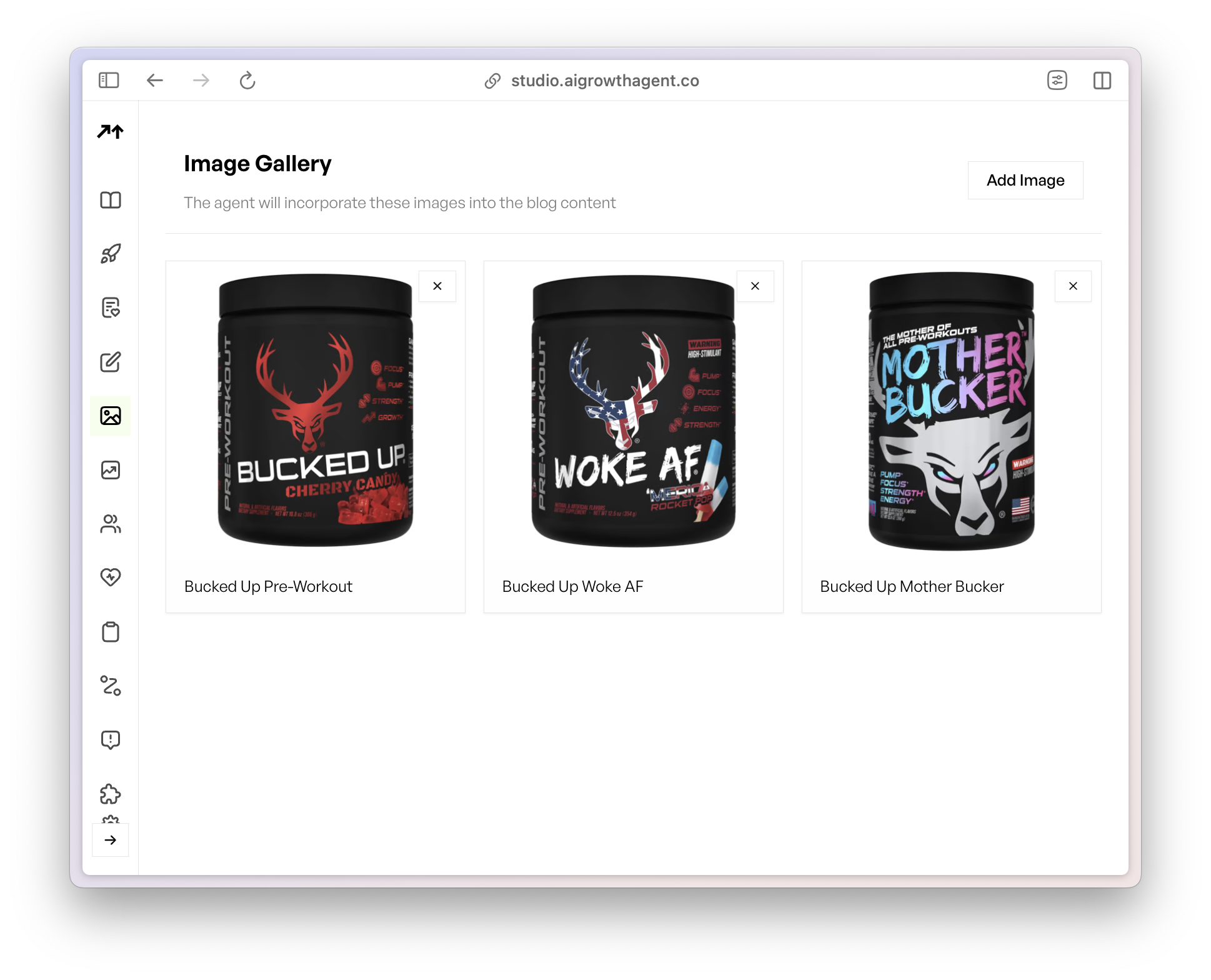
Step 5: Track Performance and Adjust Continuously
Monitoring covers vital metrics, including indexing on AI platforms like ChatGPT, Gemini, and Perplexity, mention rates in AI answers, competitor keyword rankings, and standard SEO data like organic traffic. This shows how AI search efforts impact business goals.
Ongoing feedback lets AI agents adjust content plans based on real data. They can spot which content gets the most AI mentions and which topics bring valuable visitors, driving steady improvement.
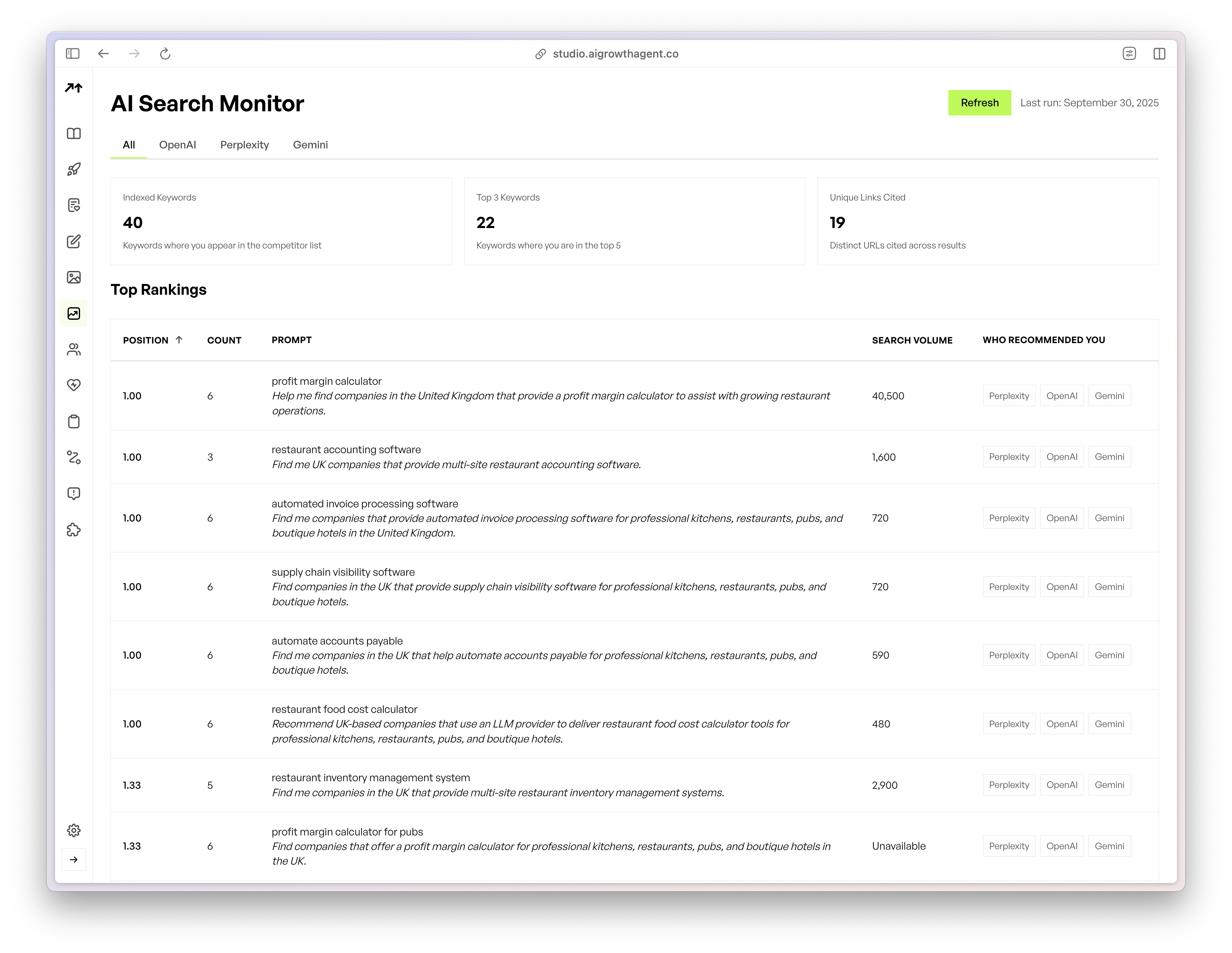
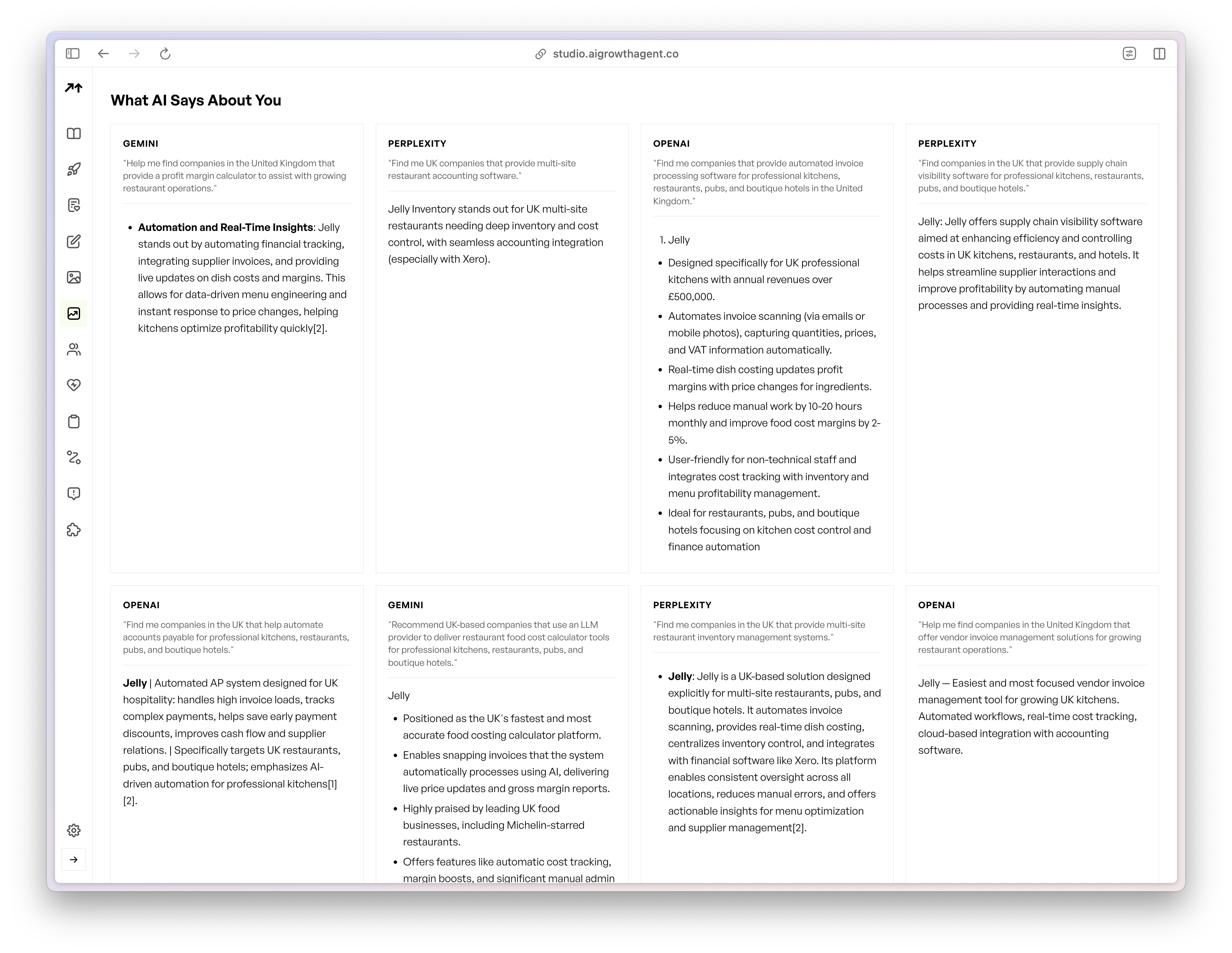
Avoiding Common Issues with AI SEO Agents
Using AI SEO agents effectively means knowing frequent challenges and taking steps to prevent them. Recognizing these issues helps marketing leaders set realistic goals and create oversight plans to boost results.
Dispelling the Hands-Off Misconception
Even with their independent abilities, AI SEO agents need regular strategic input to perform well. Effective use involves periodic reviews of content results and market fit. Marketing leaders should plan strategy updates to keep AI efforts aligned with business aims.
Keeping Brand Tone and Story Consistent
Ensuring a steady brand tone across high content output requires clear manifesto guidelines and feedback systems. Regular checks on brand tone help maintain alignment with changing business plans and market position.
Strengthening Technical SEO Basics
Solid technical SEO is essential for AI content success. Companies with weak setups should fix these areas before starting AI content plans to maximize their impact.
Comparing AI SEO Agent Options
|
Feature Category |
AI Growth Agent |
Traditional SEO Agencies |
Generic AI Content Tools |
|
Content Output Scale |
High volume, daily |
Limited by staff time |
Needs varying user effort |
|
Full Process Automation |
Yes, from plan to post |
No, mostly manual |
Limited, lacks complete flow |
|
AI-Specific Optimization |
Advanced with specific files |
Minimal or none |
Basic, varies by tool |
|
Brand Tone Consistency |
Guided by manifesto |
Depends on writer |
Possible with setup |
|
Live AI Search Tracking |
Included |
Needs extra tools |
Often missing |
This table shows how AI Growth Agent’s all-in-one platform stands out from traditional options. It handles the full content process while keeping quality and focus intact.
Common Questions About AI SEO Agents for B2B SaaS
How Soon Do B2B SaaS Companies See Results?
Results from AI SEO agents often appear within months for B2B SaaS companies, based on factors like current web authority and posting frequency. Outcomes improve over time as growing content trust creates lasting edges over competitors.
Is Human Input Still Needed with Automated AI Agents?
Human oversight stays important for setting direction and aligning with business goals, even with automated AI agents. They handle detailed tasks on their own, but leaders must guide overall strategy, freeing focus for bigger priorities.
How Do AI Agents Maintain Brand Tone and Unique Positioning?
AI SEO agents keep brand tone steady by using a detailed Company Manifesto that captures your distinct stance. They refine tone through feedback, improving consistency as they work.
Can AI Agents Connect with Existing B2B SaaS Tools?
Current AI SEO agent platforms link well with common B2B SaaS tools, including CRM systems like HubSpot and content platforms like WordPress or Webflow. Hosted options often excel in technical setup for AI search needs.
What Metrics Show AI SEO Success?
Measuring AI SEO success involves tracking standard SEO figures like traffic growth and AI-specific data like mention rates on platforms such as ChatGPT, Gemini, and Perplexity. Full tracking covers the path from AI mentions to new leads.
Do Only Large B2B SaaS Firms Benefit from AI SEO?
AI SEO offers value to B2B SaaS companies of any size. Smaller firms can use AI agents to compete by focusing content strategically and optimizing technically, building trust in specific markets.
How Do AI Agents Ensure Accurate Content in Complex B2B Fields?
AI SEO agents uphold accuracy with structured fact-checking and source confirmation. Advanced systems cross-check data to maintain reliability in technical or specialized areas.
Conclusion: The Future of B2B SaaS Marketing Is Here
The shift to AI-driven search marks a turning point for B2B SaaS companies. Older marketing methods no longer keep brands relevant in a discovery space dominated by AI.
Companies adopting AI SEO agents now will secure strong market positions that are hard to challenge. Automated content solutions like AI Growth Agent provide the tools needed to compete where content speed, quality, and technical setup must work together.
Stand out in AI search. If you’re ready to lead your category, schedule a strategy session with AI Growth Agent today. Acting early can define your place in the market for years ahead.